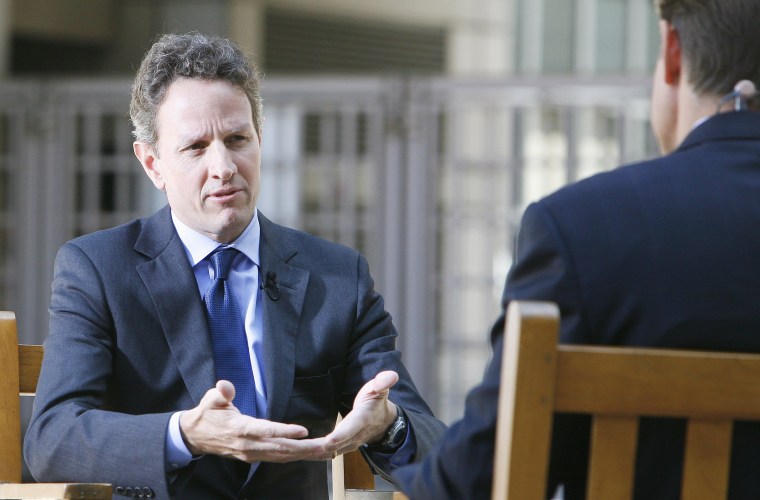Timothy Geithner, architect of bank, auto and economic rescue plans, has another high-stakes job these days: traveling bond salesman.
The recession, financial crisis and two wars have pushed the federal deficit above $1 trillion, a record level that makes the Treasury secretary's role as chief marketer of U.S. debt tougher than any of his recent predecessors'.
Geithner, who traveled last week to the Middle East and Europe, has to convince foreign investors to keep buying Treasury bills, notes and bonds; they hold nearly half of the government's roughly $7 trillion in publicly traded debt.
"He's a smart guy but it's a very, very big task," said Dean Baker, co-director of the Center for Economic and Policy Research, a left-leaning Washington think tank.
If foreign demand for U.S. debt sags, that could drive up interest rates and spell big trouble for an economy hobbled by 9.5 percent unemployment. Higher rates would make it more expensive for consumers to buy homes and cars, and for businesses to finance their operations.
In the worst case scenario, a rush by foreigners to sell their U.S. debt could send the dollar crashing and inflation soaring. Because that would also hurt the value of their remaining holdings and the U.S. economy — a key market for their exports — private analysts believe such a scenario is not likely to occur.
With the risks in mind, Geithner last week visited Saudi Arabia and the United Arab Emirates, whose vast oil wealth gets recycled into Treasury holdings.
Last month, he visited China, the largest foreign holder of U.S. Treasuries. That trip was marked by an extra dose of drama. In March, Chinese Premier Wen Jiabao said his country was concerned about the "safety" of the large amounts of money it had lent to the United States.
Throughout these trips, Geithner very much stuck to his sales script, at least in his public pronouncements. He said the Obama administration was committed to guarding the value of the dollar and, once the economy improves, shrinking the deficit.
The deficit has been driven higher in part by the $787 billion economic stimulus package and $700 billion financial system bailout approved by Congress over the past year.
The deficit-cutting proposals the administration has so far revealed would fall far short of what is needed.
"If the Obama administration has a credible plan to bring the deficits down, they are keeping it a deep secret at the moment," said Michael Mussa, senior fellow at the Peterson Institute and former chief economist at the International Monetary Fund.
With nearly three months left in the budget year, the Obama administration forecasts that this year's deficit will total $1.84 trillion, more than four times the size of last year's record tally.
The nonpartisan Congressional Budget Office estimates the annual deficits under the administration's spending plans will never drop below $633 billion over the next decade. And it forecasts an additional $9.1 trillion added to the debt held by the public — the amount that Geithner has to finance with bond sales.
During a stopover in Paris on Thursday, Geithner acknowledged in an online chat sponsored by the French newspaper Les Echos that "the dollar's role in the international financial system places special responsibilities on the United States."
The foreigners Geithner meets with have a keen sense of the pressure he faces.
When Geithner told a packed auditorium at Peking University that Chinese investments in the U.S. were safe, his comment was greeted by laughter. The students appeared to be laughing more at the quickness with which Geithner had responded to a question, not at what he said. Still, the reaction did highlight underlying skepticism.
Officials in the Middle East last week gave no public hint of nervousness.
UAE crown prince Sheik Mohammed bin Zayed Al Nahyan, who met with Geithner last Wednesday, stressed the strength of his country's relationship with the U.S. in comments carried by state news agency WAM.
"The UAE attaches great significance to further promoting cooperation with the friendly United States in all areas, and in banking, finance, trade, investment and education in particular," Sheik Mohammed said.
But such easygoing relations could fray if the U.S. isn't careful about its spending, some economists warned.
That goal is even more urgent with China, Russia and some other countries grumbling that there should be alternatives to having the U.S. dollar serve as the world's reserve currency.
Publicly traded U.S. debt — which excludes deficits the government owes to itself in Social Security and other trust funds — stood at 41 percent of the total economy in 2008. It is projected to climb to 82 percent of the entire economy by 2019.
"If these trends are not reversed, the world will stop buying our debt and the economy will break," said Mark Zandi, chief economist at Moody's Economy.com.
